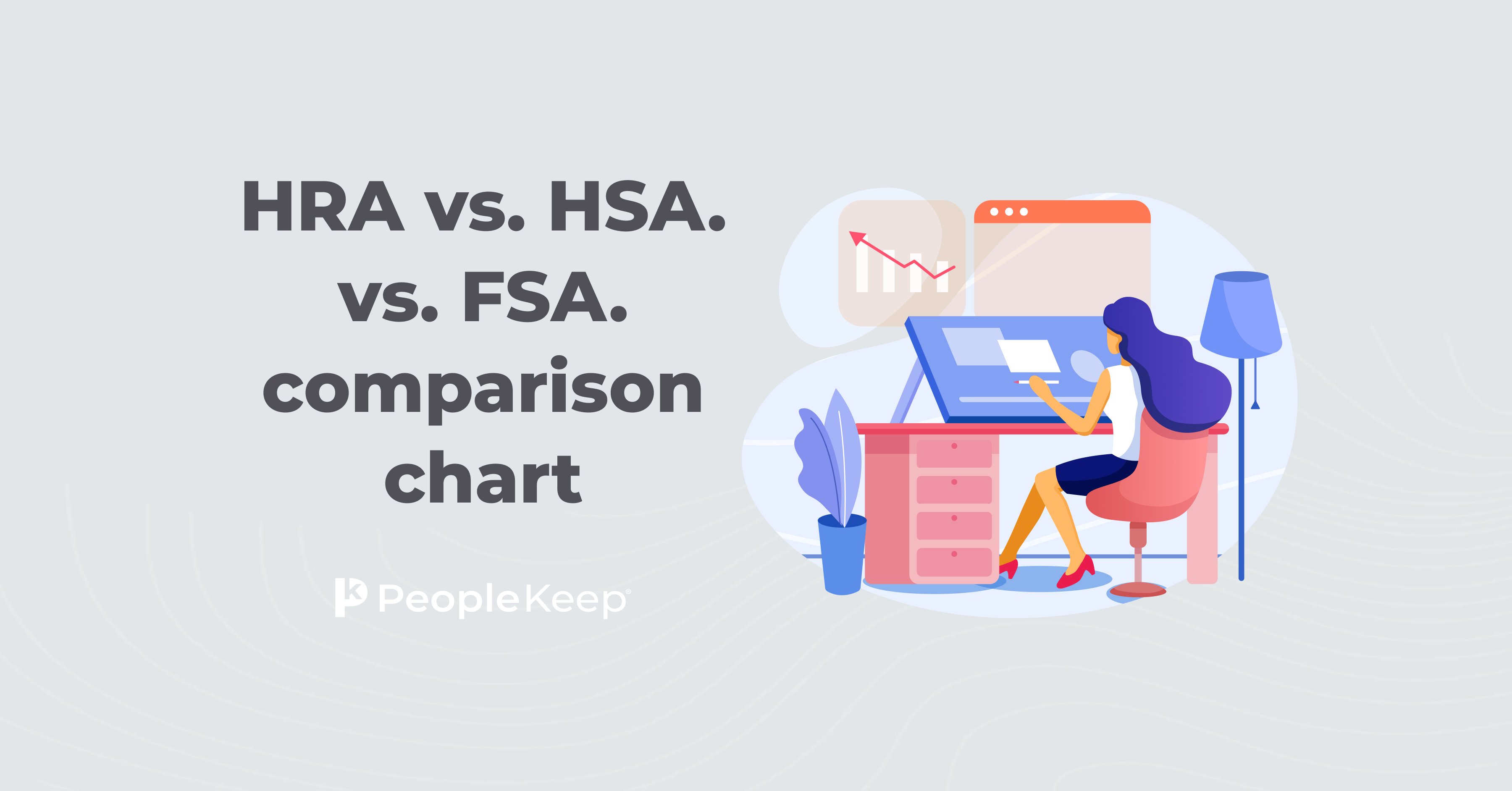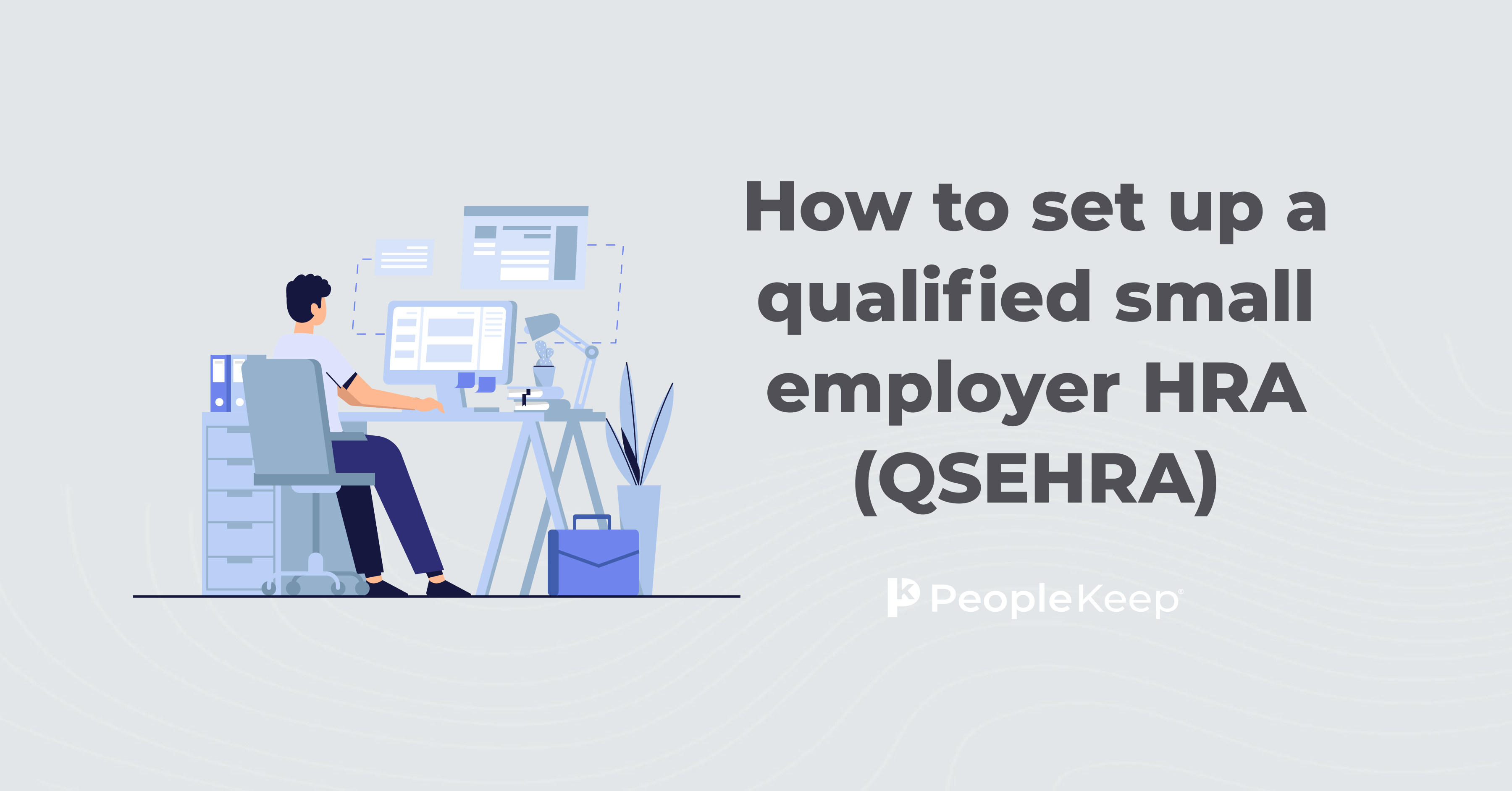Defined contribution health plans
As healthcare costs continue to rise, more companies are turning to defined contribution health plans as a way to offer flexible and cost-effective benefits to their employees.
Will a defined contribution health plan work for your organization? Schedule a free consultation with one of our HRA specialists.

- Chapter 1 Looking for a more cost-effective and flexible way to offer health benefits to your employees?
- Chapter 2 What is a defined contribution health plan?
- Chapter 3 How defined contribution health plans work
- Chapter 4 The benefits of a defined contribution health plan
- Chapter 5 HRAs vs. HSAs
- Chapter 6 Comparing the different types of HRAs
- Chapter 7 Why HRAs work
- Chapter 8 Design requirements for defined contribution health plans
- Chapter 9 Compliance requirements for defined contribution health plans
- Chapter 10 How do you manage a defined contribution health plan?
- Chapter 11 Background on defined contribution plans (DCPs) and employee health benefits
Looking for a more cost-effective and flexible way to offer health benefits to your employees?
Rather than paying a portion of the costs to provide a traditional group health benefit like group health insurance, employers can control their costs by establishing a defined contribution health plan. You can implement these health benefit plans through the use of pre-funded accounts, like a health savings account (HSA) or through a health reimbursement arrangement (HRA).
What is a defined contribution health plan?
A defined contribution health plan is a type of employer-sponsored benefit plan in which the employer contributes a set amount of money toward the employee's healthcare expenses.
Typically, employees can use their defined contribution allowance toward qualified out-of-pocket expenses, such as insurance premiums, medications, and preventative care. But this depends on the type of defined contribution plan the employer offers.
They allow employees to be more involved in their health benefit plans, which is especially important given the rise in healthcare consumerism. These plans shift the responsibility of choosing and managing health coverage from the employer to the employee, giving individuals more control over their healthcare options, the amount they pay for coverage, and the doctors they visit.
Transitioning from a group health plan to a defined contribution health plan mirrors the shift from a traditional pension plan to a 401(k) plan for employer-sponsored retirement benefits. With a pension plan, employers guarantee a monthly check at retirement (a defined benefit plan), but employees have no say over their investment options. They can also be much more expensive for employers. With a 401(k) plan, employees own their individual accounts and have more control over their investment decisions. Plus, employers only contribute a set amount, usually matching the employee's voluntary contributions.
With a defined contribution health plan, employers don't need to pay for or manage a group plan. Some types of defined contribution plans, like HRAs, allow employees to select the individual health insurance plan of their choice and make payments toward healthcare costs out of their own finances upfront. Then, employers can reimburse them from the funds in their annual or monthly benefit allowance.
How defined contribution health plans work
Defined contribution health plans offer an alternative to "defined benefit" group health insurance. Just as employers moved away from defined retirement savings plans like pensions toward defined contribution retirement plans such as 401(k)s, many are applying this plan formula to their health benefits programs.
There are three simple steps to the general strategy of a defined contribution health plan:
- Step 1: The employer offers each employee a fixed monthly dollar amount to spend on qualified medical expenses. This might be a direct contribution to a savings account or an allowance that the employer agrees to reimburse employees for after they incur an expense.
- Step 2: Depending on the employee's plan documents and benefit design, employees may purchase several types of healthcare products and services that qualify as eligible expenses using their contributions or reimbursement allowances.
- With a stand-alone HRA, employees can select and purchase the individual or family health plan that works best for their individual needs. Employees may purchase their own policy directly from any health insurance company, through a broker, private exchanges, or the HealthCare.gov or state Health Insurance Marketplaces.
- Step 3: The employer reimburses employees up to the amount of their defined contribution allowance, or the employee uses the funds in their HSA.
Defined contribution health plans by themselves aren’t health insurance plans. They give the employer control of employee benefits costs while still giving employees a choice.
Do defined contribution plans work for ALEs?
Suppose you're an applicable large employer (ALE) with 50 or more full-time equivalent employees (FTEs). In that case, the Affordable Care Act's (ACA) employer mandate requires you to provide health insurance to at least 95% of your full-time workers who work more than 30 hours per week and their dependents. This coverage must meet minimum essential coverage (MEC) and minimum value standards.
So, what if you want to offer an HRA instead of group coverage? You can meet the mandate's requirements if you offer an individual coverage HRA (ICHRA). An ICHRA requires employees to purchase qualifying individual insurance policies that meet MEC, allowing your organization to satisfy the law.
Employers must offer an affordable allowance to comply with the mandate.
Plus, employers with group health plans can offer a group coverage HRA (GCHRA) to supplement their employees’ coverage.
The benefits of a defined contribution health plan
Now that we’ve explored what defined contribution health plans are, here’s why you might want to offer one to your employees.
It's a self-funded health or savings plan
A common reason employers use a defined contribution health plan, such as an HSA or HRA, is that they're self-funded health plans. This gives employers and employees greater control over how much they spend on healthcare benefits. With a fully-insured health plan, the insurance companies control the costs, and employers and employees alike often face expensive premiums and steep annual rate increases. With a defined contribution health plan like an HRA, employers only pay out up to their set allowance amount.
It's a tax-free health benefit
Many employers who don't qualify for group health plans or simply can't afford them resort to offering taxable wage increases. This subjects your organization to additional federal income, Medicare, and Social Security payroll taxes. This method also doesn’t comply with the ACA for ALEs.
Plus, with enhanced premium tax credits expiring at the end of 2025, many employees may no longer be eligible for federal subsidies.
A defined contribution health plan is free of payroll taxes for both the employer and employee. As long as the employee uses their stand-alone HRA allowance to purchase a qualifying policy with MEC, they can participate in the benefit, making employers' benefit dollars stretch further. Plus, employees won’t need to rely on tax credits.
It can work as a stand-alone benefit or alongside a group plan
On top of these benefits, a defined contribution health plan doesn't have to be a stand-alone benefit. Employers who are already offering a group health plan can offer a group coverage HRA (GCHRA), also known as an integrated HRA, alongside the group plan. There are a few ways to accomplish this, depending on your needs.
HRAs vs. HSAs
While HRAs and HSAs are both defined contribution plans, they work differently. Employers can offer stand-alone HRAs independently of group health insurance plans, while HSAs require HSA-eligible high deductible health plans (HDHPs). Employers can also offer HRAs, such as a GCHRA, in conjunction with group plans.
There are also annual limits on employer and employee contributions with HSAs. Employees who are 50 and older have the option to make additional catch-up contributions. While there are annual contribution limits with a qualified small employer HRA (QSEHRA) and excepted benefit HRA (EBHRA), other HRAs, like the ICHRA or GCHRA, have no limits on employer contributions.
Additionally, the employer owns and manages the HRA, as it's an arrangement instead of an individual account. However, the employee owns the HSA, meaning they can take their contributions and your contributions with them when they leave your organization. With an HRA, the unused funds stay with you.
Another significant difference is which expenses are eligible. With a stand-alone HRA, like the QSEHRA or ICHRA, you can reimburse employees for individual health insurance premiums, dental and vision insurance premiums, and more. This allows you to offer an HRA instead of a group health plan. However, an HSA can’t pay for insurance premiums.
ICHRA
Individual coverage HRA (ICHRA) health benefit that enables employers to cover the individual insurance plans their employees choose.
QSEHRA
Qualified small employer HRA (QSEHRA). A powerful alternative to group health insurance made specifically for small employers.
GCHRA
Group coverage HRA (GCHRA) health benefit that employers can use to help employees with their out-of-pocket expenses.
This comparison chart breaks down the types of plans to simplify the decision-making process.
|
|
QSEHRA |
ICHRA |
GCHRA |
|
Business size restrictions |
The QSEHRA is only available to businesses with fewer than 50 FTE employees. |
None. |
None. |
|
Annual contribution limits |
The annual limits for employer contributions in 2026 are $6,450 for self-only employees and $13,100 for employees with a family. Businesses can't give employees different allowance amounts based on criteria other than age and family status. |
None. Organizations can give different employee classes different amounts. You can also differ allowances by age or family status. |
There are no minimum or maximum contribution requirements. Businesses can give different employees different allowance amounts based on job-based criteria. |
|
Group health policy requirements |
Employers can't offer a QSEHRA with a group health policy, including any group dental or vision plans. |
Employers can offer an ICHRA and a group health policy, but you can’t offer both benefits to the same employee classes. Employees also can't have a choice between the group policy and the HRA. Employers can still offer group dental and vision plans to employees with an ICHRA. |
Employers must offer a GCHRA with a group health policy. |
|
Individual health policies permitted |
Yes. |
Yes. Employees must have individual health insurance policies to participate in the ICHRA. |
No. |
|
Premium tax credit coordination requirements |
If the employee’s QSEHRA allowance is affordable, they can’t collect their tax credits. If their QSEHRA allowance is unaffordable, employees must reduce their premium tax credit by the amount of their HRA allowance. |
Employees can't collect premium tax credits and participate in the ICHRA. However, if the IRS considers the ICHRA allowance unaffordable, employees may waive the HRA and collect the credits. |
N/A. These HRAs can’t reimburse employees for individual premiums. |
|
Medical expenses available for reimbursement |
Any or all items outlined in IRS Publication 502. |
Any or all items outlined in IRS Publication 502. |
Any or all items listed in IRS Publication 502, except for insurance premiums. |
|
Employee eligibility guidelines |
All full-time employees are eligible. Businesses can decide on part-time employee eligibility. |
Businesses can decide on eligibility based on 11 different employee classes. |
Employees must enroll in the group health plan. |
Why HRAs work
Defined contribution health plans work for employers and employees because:
- Individual health insurance costs 20% - 60% less than comparable group health coverage. The employer's healthcare dollars go further.
- Contributions are tax-deductible to the employer, and employees receive reimbursements income tax-free.
- The employer gains fiscal control and predictability over their health benefits budget.
- There are no minimum or maximum contribution amounts, depending on the HRA offered, and no minimum participation requirements.
- Employees have control over their individual health insurance plans, enabling them to make consumer-driven choices.
Design requirements for defined contribution health plans
There are two key questions to ask when designing your health plan.
When will the plan year start?
Your organization can decide when your defined contribution plan will start. For many organizations, this is at the beginning of the year, but it doesn't have to be.
How much will you provide each month?
You probably already have a budget in mind for health benefits. Within this budget, how will you divide up employees' monthly allowances? If you offer an HRA, you will come up with a monthly allowance that employees can use toward health expenses.
With an ICHRA, you can provide the same monthly allowance amount to all employees or different monthly allowances to different types/classes of employees. You must base employee classes on 11 types of job-based criteria.
An ICHRA also allows you to provide an ICHRA to only certain employee classes, such as part-time or hourly employees, while still offering a group health insurance policy to a different employee class, such as salaried employees.
You can also vary the allowance amounts by family status on any HRA.
Compliance requirements for defined contribution health plans
The federal government sees Section 105 plans as group health plans. As such, they must comply with IRS, HIPAA, COBRA, ERISA, and ACA regulations.
This section details compliance requirements that may impact your health benefit options.
Internal Revenue Service (IRS) requirements
The IRS has many rules that organizations must satisfy for benefits, such as HRAs, to be tax-advantaged.
The IRS requires the following:
- Documentation: The IRS requires that employees submit proper documentation verifying their claim for reimbursement and that employers save supporting documentation on file for ten years.
- Eligible expenses: The IRS maintains the list of HRA- and HSA-eligible expenses. You may only reimburse employees for these qualifying expenses.
- Nondiscrimination: Defined contribution health plans must comply with nondiscrimination rules. The rules state the plan must not discriminate in favor of highly compensated individuals (HCIs) with respect to eligibility to participate in the plan or benefits provided under the plan.
Health Insurance Portability and Accountability Act (HIPAA)
HIPAA rules apply to defined contribution health plans. To administer a plan correctly, the entity processing employee reimbursement claims receives protected health information (PHI) that the government requires you to hold confidentially.
Consolidated Omnibus Budget Reconciliation Act (COBRA)
For plans subject to ERISA with 20 or more participants, employers must give terminated employees the option to continue their participation in the plan for a period after termination and may charge an employee up to 102% of the value of their allowance if COBRA is elected. Many states have their own COBRA laws that apply to smaller organizations. COBRA rules don’t apply to HSAs or QSEHRAs.
Employee Retirement Income Security Act of 1974 (ERISA)
ERISA rules apply to all formal health benefits, including traditional group health insurance and HRAs.
ERISA requires every welfare plan to have a summary plan description (SPD) and to furnish copies to each participant.
ERISA also requires that employers establish and maintain written plan documents. Plan documents define what expenses are eligible for reimbursement, the amount of employer contribution, and other required details about the reimbursement plan. If you use PeopleKeep as your plan administrator, we automatically generate your plan documents.
The U.S. federal government also has specific regulations employers must comply with to reimburse employees for individual health insurance premiums without triggering ERISA plan status for the individual health insurance policies. For example, the employer can't endorse specific individual health insurance policies or pay directly for them.
Affordable Care Act (ACA) rules
Several ACA regulations apply to defined contribution plans.
ACA rules to know include:
- Annual limit compliance: Section 2711 of the Public Health Services (PHS) Act, as added by the ACA, provides that no annual or lifetime limits may be placed on essential health benefits (EHB). The act provides that annual limits and lifetime limits may be placed on benefits that are not EHB, such as health insurance premiums.
- Preventive care compliance: Section 2713 of the PHS Act requires group health plans (including defined contribution plans) to cover basic preventive health services without cost-sharing.
- 90-day waiting period compliance: The ACA prohibits waiting periods longer than 90 days for eligible employees.
- Internal and external claims appeal process: The ACA added new requirements to the internal and external appeals process, including clearer standards for notifying participants about procedures.
- Dependent coverage for adult children up to age 26: Section 2714 of the PHS Act provides that group health plans (including defined contribution plans) that make available dependent coverage for children must make such coverage available for children until 26 years of age.
- Uniform explanation of coverage and definitions: The ACA requires that group health plans, participants, and beneficiaries receive a standardized summary of benefits and coverage (SBC) and a set of uniform definitions (uniform glossary), both of which must conform to requirements outlined in the ACA and existing regulations.
- PCORI fee: The ACA includes a research fee that individual health insurance plan sponsors must pay annually via IRS Form 720.
- 60-day notice of material modification: The ACA requires employers to provide 60 days of advance notice to participants when making material modifications to their group health plan.
How do you manage a defined contribution health plan?
If your organization decides to offer an HRA to your employees, you have three options:
- Self-administration of your health benefits
- Use a third-party administrator (TPA) to ensure compliance
- Use a software solution
If you decide to manage your defined contribution health plan on your own, you take on all of the various responsibilities and liabilities for those benefits, including compliance.
Many organizations choose a third-party service or software solution to avoid this risk and ensure proper compliance.
When you use PeopleKeep by Remodel Health as your plan administrator, you keep complete ownership of your HRA while taking advantage of our award-winning customer support and easy-to-use platform. We’ll generate legal plan documents and review all of your employees’ reimbursement requests to ensure compliance with federal regulations. If you want more hands-on support and automatic premium payments, Remodel Health’s ICHRA+ platform might be right for you.
Background on defined contribution plans (DCPs) and employee health benefits
In the 1970s, many U.S. employers went bankrupt due to the rising costs of their defined benefit retirement programs. Beginning in the 1980s, employers shifted to more affordable “defined contribution” retirement savings programs, which now cover more than 100 million Americans.
Today, employers face a similar challenge in the employee health benefits space. Traditionally, companies have offered a defined benefit group health insurance plan in which the employer decides the insurance benefits and selects the carrier. This approach offers little protection against annual cost increases in an unsustainable and unpredictable market.
Defined contribution plans offer both cost certainty and simplicity. Just as 401(k) plans reshaped the retirement landscape, employers can now gain cost control while still giving employees access to affordable, high-quality, and portable health insurance. It is essentially a 401(k) for health benefits. Instead of defining the benefit itself, the employer contributes a fixed dollar amount, referred to as the defined contribution, and employees choose the individual health coverage that works best for them. In short, DCPs allow employers to step out of the health insurance business and focus on what they do best.
Frequently asked questions
Depending on the plan you choose to offer, you can make the health benefit available to certain classes of employees only. For example, with an ICHRA, you can offer different allowances to employees in different job-based groups. To learn more, see our article on employee eligibility.
The major difference between HRAs and HSAs is that the business owns the HRA while the employee owns the HSA. In addition, an HRA is a reimbursement arrangement between an employer and an employee, whereas an HSA is a savings account owned by the employee. To learn more, see our article on HRAs vs. HSAs.
Yes! Unique rules apply to users, especially regarding what items are available for reimbursement when an HSA is in place. To learn more, read our articles on using a QSEHRA and HSA together and using an ICHRA and HSA together.
HRAs can reimburse many healthcare products and services, including the following types of insurance premiums, provided they were not already paid with pre-tax dollars:
- Major medical individual health insurance premiums
- Dental care and vision care premiums
- Qualified ancillary premiums (e.g., accident policies)
- Medicare Part A, Medicare Part B, Medicare HMO, and employer-sponsored health insurance premiums
- Medicare Advantage and Supplement premiums
- COBRA premiums
To learn more, read our article on what expenses an HRA can reimburse
Contributors:

Holly Bengfort
Content Marketing Specialist
More resources

How to set up an individual coverage HRA (ICHRA)

HRA vs. HSA vs. FSA comparison chart



